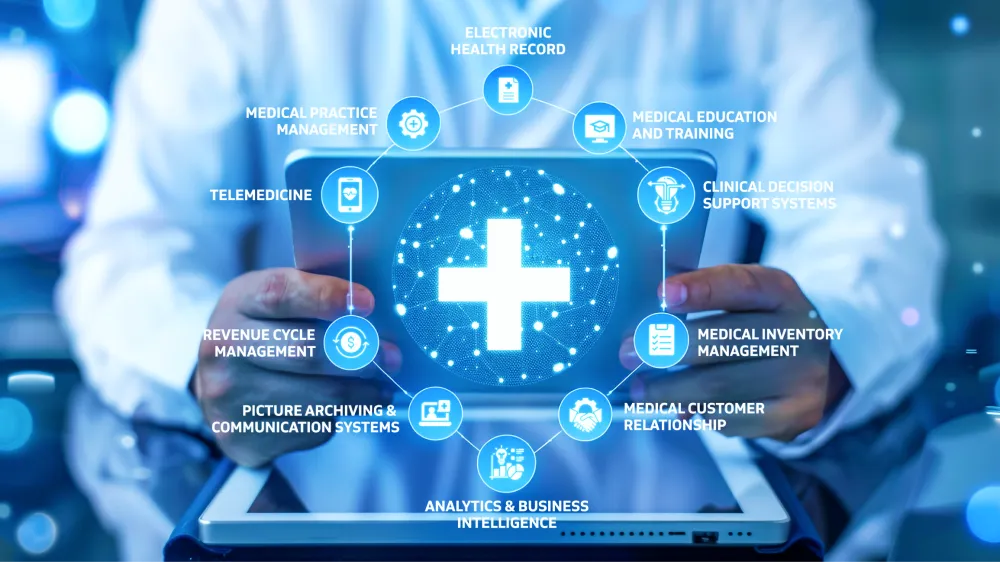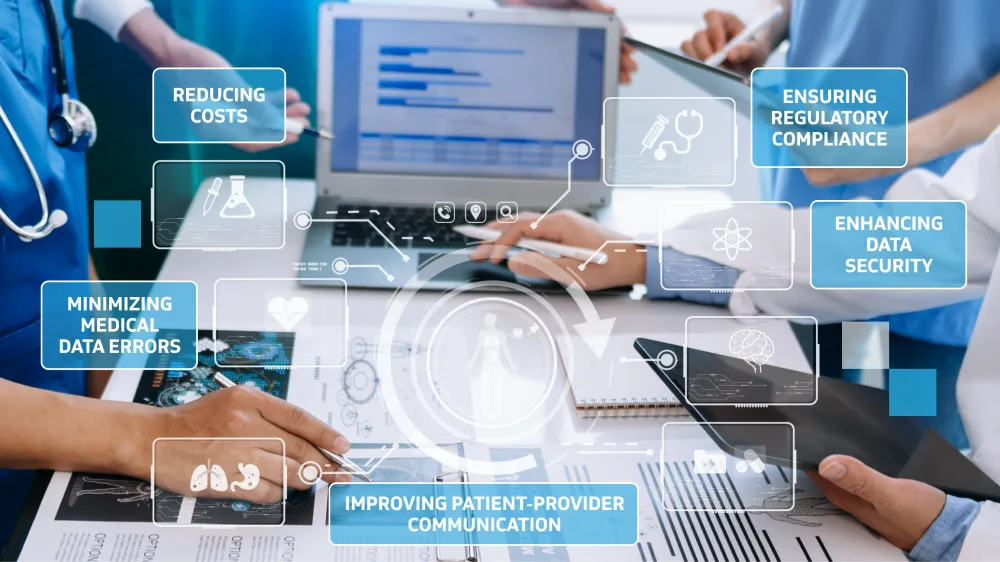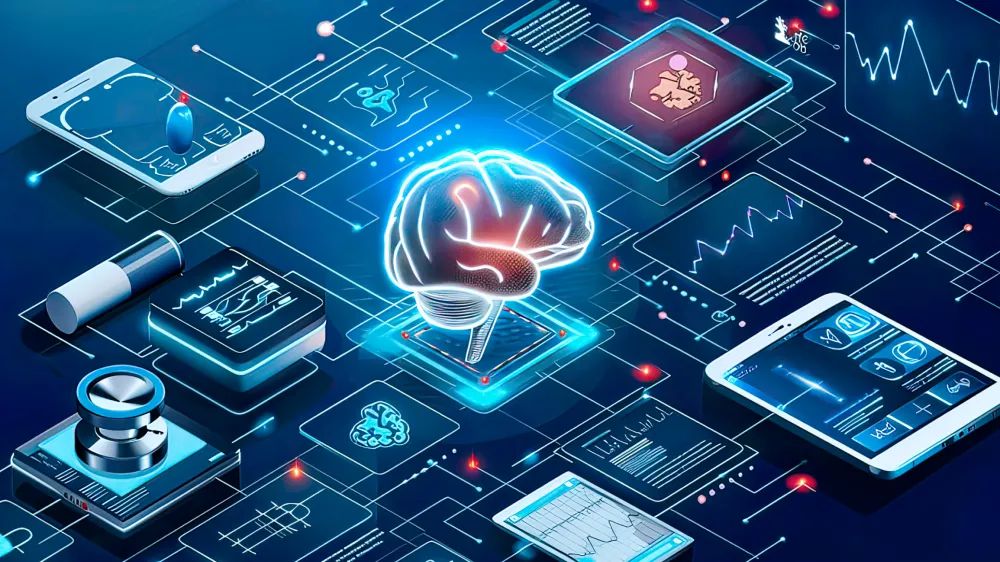McKinsey predicts that by 2025, technology-driven innovations could contribute $350-$410 billion annually to the healthcare sector, underlining the importance of modern software solutions. At the same time, the global healthcare enterprise software market is expected to grow at a CAGR of 5.68% from 2024 to 2031, with market value increasing from $3.9 billion in 2024 to $5.44 billion by 2031.
The demand for healthcare software development services is becoming crucial as the industry moves toward digital solutions to improve patient care and streamline operations. Efficient, user-friendly platforms are essential for meeting the needs of both patients and providers. However, many institutions need to adopt new technologies more quickly, leading to inefficiencies.
This growth, driven by technological advancements and expanding applications, presents significant opportunities for businesses and stakeholders to enhance care delivery. Let’s dive into our healthcare software development guide and explore the opportunities driving its rapid growth.
What is Healthcare Software Development?
Healthcare software development is a comprehensive process of creating tailored computer programs that boost efficiency, accuracy, and patient care within medical organizations.
By developing healthcare IT software, doctors can track patient health, manage appointments, access reports, and oversee staff. Patients can also gain the convenience of booking appointments, sharing reports, communicating with doctors, and receiving health advice, leading to an improved healthcare experience.
10 Types of Healthcare Software Development Solutions
Healthcare software development solutions play a crucial role in improving operational efficiency and patient care. Explore our top 10 solutions designed to enhance productivity and drive practice success.

1. Electronic Health Record (EHR) Software
EHR software digitizes medical records, enabling electronic access and management of patient information and facilitating rapid data exchange between organizations. Physicians can make informed decisions based on previous diagnoses and treatments, ensuring adequate care and reducing the risk of complications.
2. Medical Practice Management Software
Medical practice management software optimizes business operations in the fast-paced healthcare environment by automating scheduling, billing, and patient communication tasks. The platform simplifies medical practice management, integrates multiple software solutions, minimizes errors, and preserves critical information.
3. Telemedicine Software
Telemedicine software facilitates remote consultations between patients and healthcare providers through video, significantly enhancing access to healthcare. By providing online healthcare services for a wide range of needs, from minor health concerns to post-operative check-ups and recurring prescription management, telemedicine brings greater convenience and efficiency to healthcare delivery.
4. Healthcare RCM software
Healthcare Revenue Cycle Management software automates billing and claims management, ensuring timely service payments and significantly contributing to financial management. With enhanced efficiency, reduced billing errors, and improved claims handling, healthcare facilities can prioritize quality patient care while effectively managing financial processes.
5. Healthcare PACS software
Healthcare Picture Archiving and Communication Systems (PACS) software efficiently stores, retrieves, and shares medical imaging data, enhancing diagnostic accuracy and promoting timely patient care. By enabling healthcare providers to access critical medical images quickly, PACS software facilitates rapid diagnosis and decision-making while promoting collaboration between specialists through case sharing and discussion.
6. Healthcare Analytics and Business Intelligence Software
Healthcare analytics and business intelligence software deliver data-driven insights that enhance clinical outcomes and operational efficiency. By analyzing large volumes of data, healthcare organizations gain a comprehensive view of patients, processes, and performance, which aids in optimizing operations.
These tools empower healthcare professionals to make informed decisions, enhance patient care, and ensure diagnostic accuracy.
7. Medical CRM Software
Medical Customer Relationship Management software efficiently manages patient interactions and tracks referrals, fostering strong customer relationships essential for healthcare success. Personalized communications, appointment reminders, and post-visit follow-ups significantly enhance the patient experience.
CRM solutions simplify referral management, improve the patient journey, increase referral revenue, boost operational efficiency, and strengthen customer relationships.
8. Medical Inventory Management Software
Medical inventory management software helps maintain a continuous flow of medical supplies in healthcare facilities, ensuring that necessary items are available on time for patient care. Equipped with tools to manage inventory, track levels, and provide timely replenishment of essential supplies, this software allows healthcare providers to avoid stockouts, maintain appropriate inventory levels, and save costs.
9. Clinical Decision Support Systems (CDSS) Software
Clinical (CDSS) software aids professionals in making intelligent, evidence-based decisions by integrating patient data with clinical knowledge. The software provides essential information for diagnosing conditions, selecting treatments, and detecting potential risks based on patient history, best practices, and the latest research.
10. Medical Education and Training Software
Medical education and training software supports the education and training of medical professionals and experienced practitioners. The software enhances clinical skills, medical knowledge, and patient care by offering various training modules, virtual patient scenarios, and educational content. These tools improve healthcare quality by ensuring that healthcare providers are prepared and competent to deliver the best care.
Benefits of Healthcare Software Development
Custom healthcare software development has revolutionized medical operations by enhancing efficiency, optimizing costs, and improving patient care.
Our experts have identified five key advantages that drive these improvements.

1. Reducing Costs
Healthcare software systems reduce paperwork, enabling professionals to focus on patient care and core objectives. Automating tasks such as patient registration, form completion, and data storage increases efficiency while lowering costs associated with manual paperwork.
Many healthcare software developers adopt a subscription-based (SaaS) pricing model, which is more cost-effective than perpetual licenses.
2. Minimizing Medical Data Errors
Healthcare data analytics software plays a crucial role in reducing or eliminating errors, which is especially important due to the high pressure on healthcare staff. The adoption of EMR and EHR technology has simplified data management, with over 90% of hospitals and healthcare organizations utilizing these systems.
However, implementing these technologies alone is insufficient. Developing processes to minimize data entry and conversion is essential to maximizing benefits and improving patient care.
3. Enhancing Data Security
Advances in medical software technology enable healthcare facilities to efficiently transmit, store, and retrieve data. Adequate security measures are crucial for protecting both hospitals and patients. Modern healthcare software solutions even implements multi-factor authentication, robust firewalls, and spam filtering to enhance data protection within healthcare organizations.
Cloud computing offers a secure solution for storing sensitive data, providing a reliable and scalable approach to data management in healthcare environments.
4. Improving Patient-Provider Communication
Continuous connectivity enhances the sense of safety and comfort in telehealth. Digital software development for healthcare, particularly virtual consultation applications, facilitates effective communication. These medical mobile applications empower patients to book online consultations, chat with doctors, and monitor their health remotely.
With 24/7 telemedicine software, patients can consult with medical professionals anytime, providing peace of mind and convenient access to medical advice.
5. Ensuring Regulatory Compliance
Healthcare professionals manage a vast array of data, with medical records being the most critical due to their clinical and billing implications. Protecting these records is essential for complying with security and privacy regulations, such as HIPAA.
Healthcare software plays a significant role in ensuring HIPAA compliance by enhancing the security of medical records, protected health information (PHI), and patient privacy.
Custom Healthcare Software Development Process
The healthcare software product development process can vary significantly between organizations due to customization based on specific product needs. However, there are essential stages that consistently support successful healthcare software development.

1. Identify The Right Problem
Developing software alone isn’t sufficient. Understanding the specific needs of healthcare professionals and patients can elevate your solutions to meet their expectations. Conducting thorough market research reveals gaps in existing products and highlights how a new solution can effectively address these challenges.
Once the problem is clearly defined, validating the software idea becomes essential. Gathering feedback from potential users and stakeholders can help refine the concept and ensure alignment with real-world needs. Engaging with industry experts during this phase to foster a collaborative approach that will later benefit the development process.
2. Define The End Users
Defining the target audience is essential for any development, particularly in healthcare. Understanding the needs and priorities of the target user group leads to effective healthcare software development, moving away from a hit-or-miss approach, and fostering a strong connection with users.
Keep in mind that usability is always the key to success. For instance, if seniors are your end users, the interface design must feature large buttons and fonts alongside a simple user interface (UI) and user experience (UX). Once the end user is identified, consult with an experienced healthcare software development company to select the appropriate UX elements, platforms, and technologies to start developing solutions that match their needs.
3. Build A Software Product Development Team
After identifying the software’s core functionality and design, consider whether to assemble an in-house team or partner with an experienced healthcare software development company. Ensure your team has all the necessary roles, including project managers, senior and junior developers, testers, and UX/UI designers, and is well-versed in building healthcare solutions.
Once the team is in place, select the right technology stack for your software. Decide between native or cross-platform software development to effectively reach users on both iOS and Android platforms.

4. Create a Minimum Viable Product (MVP)
Developing software from scratch is resource-intensive, but an MVP allows healthcare development companies to do more with less. An MVP is an initial product version with limited features for early customers to use and provide feedback.
Creating an MVP is essential because healthcare needs are intricate and constantly changing. Developing an MVP helps confirm user interest in the product, ensuring the final version meets market demands. Receiving helpful feedback from users during this stage allows for ongoing improvements. If any issues come up, address them before launching the final version.
Read more: Healthcare MVP Development Timeline
5. Conduct Comprehensive Testing
The importance of software testing is hard to overstate. Thorough testing evaluates user experience, identifies development issues, gathers feedback, and facilitates quick adjustments. The process also serves as a critical opportunity to assess the software’s compatibility with the end users, allowing developers to choose between unit testing and functional testing while considering users’ needs.
Experience in custom healthcare software development reveals that many features developers find exciting may not resonate with users. Comprehensive software testing proves vital in identifying and resolving errors, ensuring each update enhances the overall quality of the healthcare software.
6. Release Product and Ongoing Maintenance
The next step after finalizing the development is releasing it to the market. However, deploying software necessitates ongoing support and maintenance. It is vital to recognize the significance of mobile app maintenance, as it protects the software from emerging cyber threats and ensures it stays current with new features and updates from third-party APIs.
Neglecting software maintenance can lead to severe financial penalties and other repercussions for healthcare businesses. Prioritizing maintenance safeguards the application and enhances user experience, ensuring long-term success in a competitive landscape.
Trends for Healthcare Software Development in 2025
As we enter 2025, emerging trends in healthcare software development will reshape interactions between healthcare professionals and patients, promising more personalized and effective care.

1. VR and AR technologies
In 2025, Virtual Reality (VR) and Augmented Reality (AR) technologies are transforming healthcare by enhancing patient training, education, and surgical planning. These immersive technologies create virtual environments that allow patients to mentally prepare for surgery, alleviating anxiety and providing a clearer understanding of the procedures they will undergo.
For medical professionals, VR and AR offer opportunities to refine their skills and techniques in a simulated setting, ultimately increasing the chances of successful outcomes. By integrating VR and AR into medical software, healthcare providers can reduce human errors and improve surgical success rates.
2. Internet of Medical Things
The Internet of Medical Things (IoMT) is experiencing exponential growth in the healthcare sector, a trend accelerated by the COVID-19 pandemic. By connecting various MedTech devices and tools, IoMT enables functions like remote patient monitoring and prescription management, creating a seamless network of connectivity within healthcare.
Additionally, IoMT contributes to patient cost reductions, offering long-term benefits that can transform healthcare software. Embracing IoMT will be essential for healthcare providers looking to optimize efficiency and deliver exceptional patient care.
3. AI & Machine Learning
Artificial intelligence (AI) integration in healthcare is yielding significant benefits, driven by vast data sets, advanced machine learning algorithms, and the connectivity of 5G devices. AI can analyze and interpret health data to recognize patterns, enabling accurate diagnoses and predictions of potential future health issues based on a patient’s medical history.
By automating manual tasks, AI enhances healthcare efficiency, providing round-the-clock support for nursing staff and minimizing dosage errors for patients managing their medications. Additionally, AI’s capabilities extend to detecting unusual patterns in insurance claims, thereby preventing fraud.
4. Blockchain for data security
The healthcare sector is increasingly embracing blockchain technology, marking it as a significant trend in software development to enhance industry transparency, security, and innovation. By providing a decentralized and secure platform for medical records, blockchain optimizes management operations while significantly reducing the risk of health data breaches.
Blockchain promises to revolutionize healthcare software development, offering high performance, accuracy, and security for various stakeholders, including the public, healthcare professionals, and insurance companies. Major corporations, including Google and Microsoft, are making substantial investments in blockchain research related to healthcare.
5. Big data analytics
Big data is a transformative technology essential in mining and analyzing subsets of data within the healthcare system. Advanced data analytics solutions can offer valuable insights through various activities, including supporting diagnostic and treatment research utilizing patient records and medical images. Personalization of therapies and medications becomes possible, leading to reduced patient side effects.
Additionally, this technology aids in predicting risk factors and patient prognosis, facilitating the monitoring of population health patterns and the development of effective disease prevention strategies.
6. Cloud transformation
Integrating cloud technology into healthcare is reshaping the future of patient care by enhancing service quality and advancing medical software development. Cloud transformation involves migrating business elements such as applications, data, and services from physical storage to the cloud to optimize operations.
Key benefits of cloud transformation include optimizing operations, enabling real-time access to critical data, deploying appropriate software, and ultimately improving patient care. Health systems, ranging from large hospitals to small clinics, have increasingly adopted cloud technology to manage essential data and implement medical software solutions more swiftly and efficiently.
Considerations When Choosing Healthcare Software Development Companies
Choosing the right healthcare software development services ensures a successful partnership. Let’s dive into four key considerations to keep in mind when selecting a development partner.

1. Industry knowledge
Extensive experience in the healthcare industry is crucial when selecting a custom healthcare software development partner. Partners should deeply understand healthcare organizations’ unique challenges and complexities, ranging from operational processes to regulatory requirements.
Having significant industry knowledge enables the development of software solutions to align with organizational goals and comply with regulatory needs. An ability to understand and customize technology solutions according to specific healthcare requirements should be the first thing you look for in a partner.
2. Technical expertise
A reliable healthcare software development partner must possess exceptional technical skills and familiarity with various types of healthcare software. Proficiency in utilizing the latest tools and technologies in healthcare software development can lead to success.
Strong technical knowledge contributes to creating innovative, durable, flexible, and reliable software solutions. A partner should also be capable of delivering creative solutions to complex healthcare challenges, ensuring that the developed software effectively addresses the unique needs of the healthcare sector.

3. Scalability and capacity
Custom healthcare software development must prioritize scalability to accommodate future growth in users and features. An agile development approach enables easy adjustments and modifications in response to changing needs and regulations.
A comprehensive plan for future growth should be established, facilitating the seamless integration of new features or advanced technologies. Ensuring that the software operates efficiently as user numbers or data volumes increase helps prevent disruptions or delays in service delivery, thereby maintaining a high standard of care.
4. Security measures
Selecting a healthcare software development partner requires thoroughly evaluating their data security measures. Robust security protocols safeguard sensitive information, including encryption techniques and access restrictions.
Assess the provider’s data protection strategy and understand their capability to mitigate security vulnerabilities. Reliable security processes must be in place to protect patient personal information and maintain the privacy and integrity of medical records, ensuring that they remain secure from potential cyberattacks.
Unlock Success with KMS Healthcare Software Development Solutions
The healthcare software development industry is rapidly advancing, driven by technological innovations and a growing need for efficient, user-friendly solutions. As providers strive to enhance patient care and operational efficiency, specialized software that meets strict regulations and interoperability standards becomes essential.
KMS Healthcare leads this transformation, offering tailored software development services for the healthcare sector. Our expert teams leverage agile methodologies to deliver high-quality solutions quickly.
- Platform-certified development teams for compliance and interoperability.
- Agile methodologies to accelerate SDLC from scratch.
- Ongoing support for the complete software lifecycle.
Contact KMS Healthcare to discover how we can enhance healthcare delivery with technology.